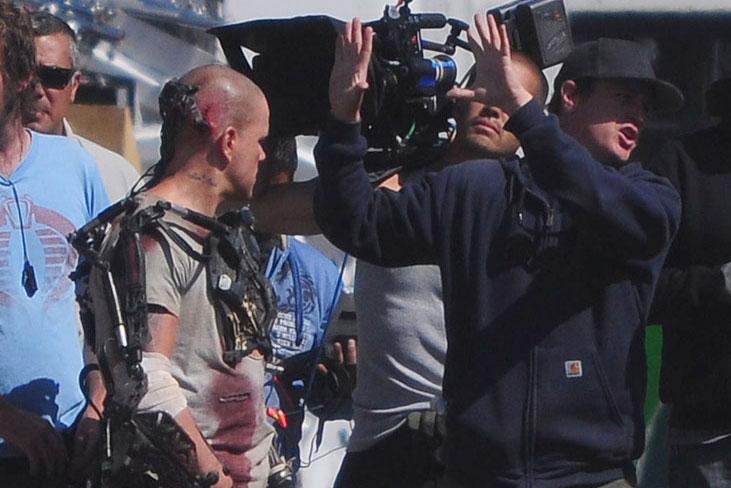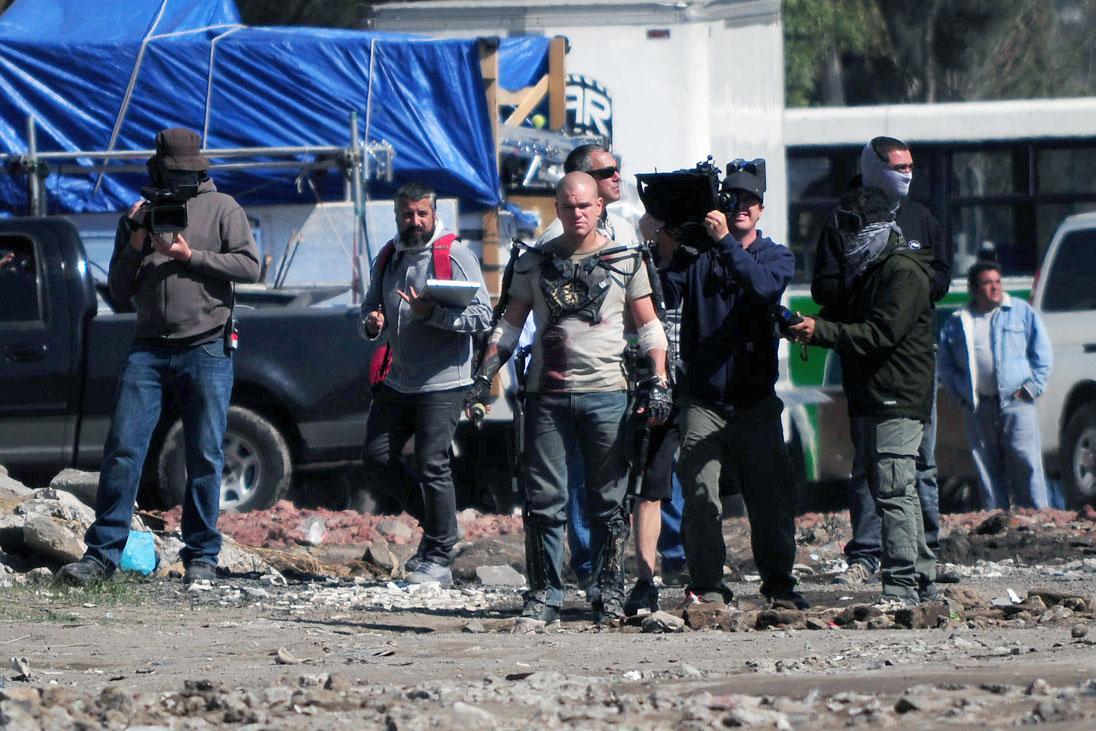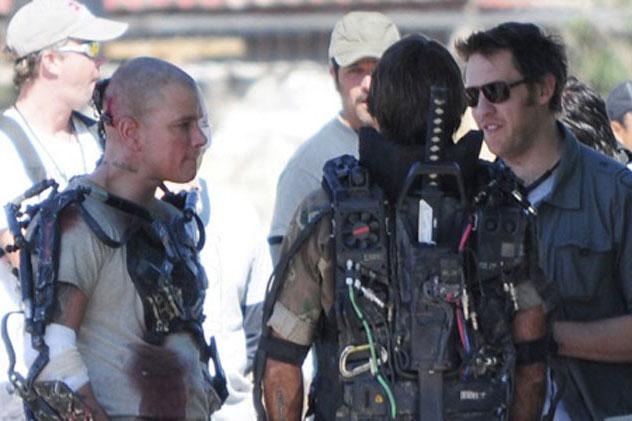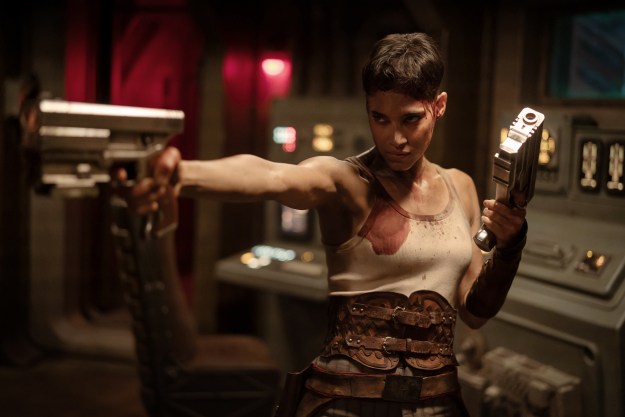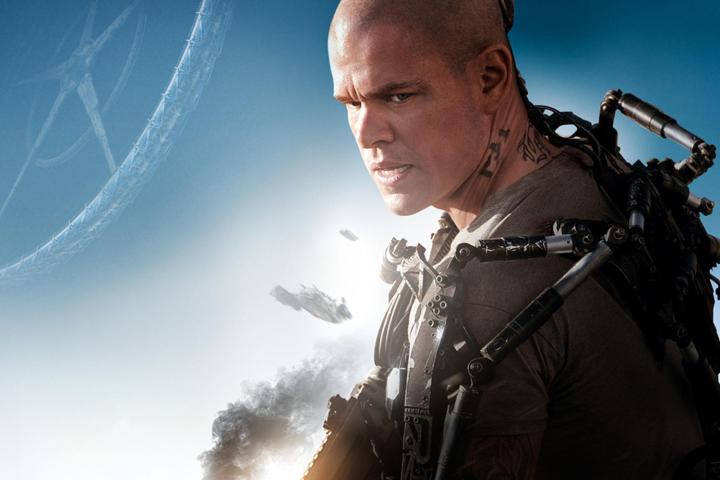
There may be no one in the world happier than Neill Blomkamp that the Halo film he planned with Peter Jackson died in the development process due to budgetary concerns. From the wake of that shutdown came the surprisingly effective District 9, which he wrote and directed, propelling him into the forefront of science fiction directors able to breathe new life into the genre. Thanks to Blomkamp’s background, visual effects have become a precision tool in his hands, allowing him to marry the storytelling process to visual effects by knowing exactly what he can expect from them. It’s also why his films aren’t entirely laden with VFX, and he puts the impetus of the story on the actors and not the green screen.
Blomkamp’s newest film Elysium opens this weekend, putting Matt Damon in a near-future that emphasizes the gap between the 99 percent and the 1 percent, and underscores what happens when the elite begin to lose their own humanity by separating themselves from those that they consider to be below them. We spoke to Blomkamp about his newest movie and what went into creating the look and feel of this world, how he created boundaries in the story, designing future weaponry, and much more. Read on for the full interview.
There are a few very, very minor spoilers here.
How difficult and interesting was it for you to design Elysium and the Stanford Torus (space habitat) as an entity?
It was incredibly difficult, but also really, really rewarding. That was one of the main reasons I wanted to make the film actually, because of the satirical nature of putting rich people in space with a Torus that has Beverly Hills houses and swimming pools. I just wanted to see that get realized and I was really devoted to the idea of that. I love visuals and I love computer graphics and I just wanted to bring that to life, but doing it was more difficult than I expected.

It was like … the visual effects in District 9 are very similar to the robotics in this film and the vehicles, they’re all of the same genre. But the Torus is a whole other ballpark. It’s like Pandora in Avatar, it’s a different way of doing things where you’re building that asset from scratch. It’s a bunch of black pixels if you look at the screen prior to building the thing, so it was very different. It was actually a rendering nightmare. We had four trillion triangles in some of the scenes, which kept crashing a lot of the servers.
With the medbays in the film was there – as you were developing the script – was there an effort to draw a line? How far could they go? We see one character’s face get entirely reconstructed. Was there ever an effort to draw a line about how powerful they were?
“One of the most difficult things for me… was balancing metaphor against science fiction. “
Well, apparently they don’t age any longer.
Well, one part of answering the question is because I don’t think the film is speculative science fiction and is so much more a metaphor from today in my mind. One of the most difficult things for me, making the film – and I don’t know whether I got this right or wrong – was balancing metaphor against science fiction. So I went to sci-fi to say this is the rich and this is the poor, but I’m showing it to you through a different lens. The way I always described it was it’s like being American, but looking over the wall of Mexico longingly. That was the idea. That’s why it’s future LA.
So, on Elysium you can imagine that if you went totally speculative sci-fi in the year 2154, the film becomes different, then you’re making a film about speculative ideas of what society might be like and what will happen is they’re no longer rich. Now it’s more like Star Trek, like there’s something else and the link between, ‘Oh, they’re rich people with pools’ has been lost.

So the medpods weren’t there for science fiction reasons, they were there just to represent that the poverty stricken person from El Salvador could go into parts of LA to get better medical attention or medical care for their kids. Medical aid is one of the things the First World has and longevity if you just look at the stats. So it was more a metaphor tool, but you are right in the sense about … like, well how far do they go, at what point is it just immortality? I think they probably live a few hundred years and then they die in the construct of the film.
Was there a timeline you kind of established because when you see the main characters as kids, when they’re reading what looks like a children’s book about Elysium, was there a timeline you established of how long Elysium has been there?
Well the idea was that it was divided between reality and metaphor. So to keep the metaphor if it went beyond 2150, then society would just become too alien, but at the same time if it was not far enough it wouldn’t be believable they could have even built the Torus. So I picked a date where I thought it could take a long time, like a generation to build the thing. So if they built it around 2050 to 2080, you could have a generation or two live on it by the time the film began and that was the idea.
… “in my opinion fifty or sixty years from now is the Elysium in Los Angeles that is the gated, much more militarized areas of superwealth, where on the outskirts lie the eroded…”
Initially, not really. What happened was after District 9, I just wanted to not work with him, you know, even though he’s so talented it was just like, ‘Let me go do something else.’ But I sent him the script and he loved Kruger and he was all ‘Let me play Kruger, just let me play Kruger,” and I think when I wrote him originally he was British. It’s like they were all cut from the same cloth. It’s like British SAS and South African Mercenaries, Australian Mercenaries, and so on. They were all the same dudes that were in Iraq and Afghanistan. They were a little bit different to American Mercenaries. So I wrote this British guy, but he said, ‘He could be South African, he could be this, he could be that’ and I started to think it was a really good idea. I mean I always want to work with Sharl because he’s so talented, but what I didn’t want to do was have a situation where its like his energy is in the front and center of the film in multiple films that I’ve done. You know, because directors can get into that loop. But then he put himself on tape with a bunch of tests of what the character could be like and I liked it so much that I said, “Dude you have to play it.”
You had a lot of fun with weapons in District 9, and there is more futuristic weaponry in this film. Do you have a direct hand in designing those? There’s definitely a feeling of video game influence and I know you were involved with the Halo film back in the day, but we’re wondering how much video game influence actually goes into your work.
I think the video game influence stuff is there, but I think it’s fairly subconscious. It’s sort of like when people were asking me about anime and I think that’s the same thing. I was obsessed with Masamune Shirow in my early twenties and I think it just goes in and then it comes out. So, I totally agree with you in terms of games and I play a lot of games, but it would be difficult to, if I actually have to pinpoint where something come from. The only one I can think of that I know comes from something is the gravity gun in District 9 and it’s from Half-Life 2. That I know, but other than that I’m not sure.

And it’s not just the weapons. I happen to be a director, but I almost feel more like I’m actually really more of a visual artist or an engineer. I love engineering, so I get really obsessive about that stuff, and one of my favorite parts of the process is designing and creating and … you know I would probably be doing that if I just stopped directing, I would go and work at WETA or something. What I’ll do is first is write a description of whatever it is. If it’s a gun, or if it’s like the Raven that Sharlto flies in Elysium, and then I’ll sketch what my idea is, and then I’ll give the description and the design to WETA, and then most of the time they’ll riff on my design and occasionally they’ll come up with something totally different. They’ll say “What about this as a B option?” And then in certain cases I’ll go one step further and model it in 3D if I really feel passionate about it and then that will for sure stay. Then they’ll draw on top of it and basically make it film ready and then go from there. That’s the process, usually.
“I pretty firmly believe that the effects are now at the point where you can just do whatever you want. “
Same thing with the hulk suit and the Torus as well?
The process for those was the hulk suit was a bunch of sketches, just very loose sketches and the Torus was … the Torus I don’t think I ever sketched. I just described how many spokes it had and what the dimensions were. I think I did a cross-section because I wanted the hills to go up on the side so that it was like a trough for oxygen, and I detailed what that cross-section would look like. And then with that and the description, Syd Mead did a lot of illustrations and then from there Image Engine in Vancouver did more illustrations on top of that and then it was set and we started modeling it.
You started in visual effects, so what are your thoughts on that now that you’ve directed?
Nothing has really changed from my perspective. From their perspective I know for whatever reason how much more diabolical it’s gotten almost, it’s so cut throat now in visual effects that the margins are so narrow and it’s so competitive that companies are going under. But other film departments have been around for a hundred years longer you know, and effects hasn’t. It’s this weird entity that is responsible for so much of the film, but they’re not unionized and they’re the ones that get skimped on the most. They get the worst rates and it’s strange how it works, but for me as a director, process isn’t any different.
If you’re aware of the technology, you just know that much more that you can do. It’s like Cameron doing Avatar or Pete Jackson doing anything, you just know what the VFX team can do, so you do it. But I pretty firmly believe that the effects are now at the point where you can just do whatever you want. So the question is now up to the film maker, it’s not up to the effects guys. It’s like you need to come up with a concept or a story or a world or all everything that people want to go see in the theater and you need to execute it properly because we can do pretty much anything now. So if it’s something that requires giant resources, you need to do it in a way that is economically makes fiscal sense, but that means that the film needs to be X and you need to be okay with that. Or you can tone that down and the film can be more risky, but you can do whatever you want.
You can do it in such a way because you’re comfortable with it. Where there are no surprises.
There’s definitely a smoothness to the process if the director knows how VFX works and it’s also more cost effective. I think Elysium should have cost probably $150 million. And could have used the extra fifty million on the film, but what I see happen a lot with other directors that don’t know VFX is that they make notes in visual effects meetings like they would make notes at a costume or wardrobe design meeting where what they don’t know the ramifications of what they’re saying. What they’re saying to visual effects ears, they’re burning down the house. They’re basically saying the worst shit that you could possibly hear as a visual effects team, but to the director who doesn’t know how the process works, I totally see how you could come to that conclusion.

It’s like, ‘Well we just need to change his jacket, why can’t we change his jacket?’ Because when it’s on set, you can tell if someone switched that out and to the director that kind of thing makes sense, but in VFX the remodeling of that, the re-rigging of that, the putting it back on the character, the re-simulation of the dynamics of it and then the rendering of it, they don’t know what that actually means and that’s why you can smash the morale of the team if you pound it to the ground. You know you’ve just got a bunch of dead animators by the end of the project, which Elysium was actually close to doing just because the Torus was difficult to get to at photo realistic stage.
You mentioned in an Entertainment Weekly article that you could see pockets of poverty appearing in the United States in 50 or 60 years. What do you think is going to lead to that or why you think that?
Well, I think it’s a global thing. The U.S is forced to become more and more of the global community and we’re just reaching a place in the world we’ve never reached before where we have so many people, and we have less and less ability to feed and give them water and do everything else we need to. To the point where it’s like the movie, the only way they can raise their standard of living is to move to the areas that have high standards of living and the altruistic people want to see that happen and it’s morally the right thing to do, but the bucket gets emptied out, you know? And I think you see all of that relative wealth begin to decline. Like in South Africa, their economy is a perfect example, like the Russias, the Chinese, the Brazils, and South Africas where the realistic version in my opinion 50 or 60 years from now is the Elysium in Los Angeles that is the gated, much more militarized areas of superwealth, where on the outskirts lie the eroded, disappeared middle class and absolute poverty. I think a lot of Americans will definitely disagree with me about that.
(Images and video © Sony Pictures Digital Productions Inc. All rights reserved.)
